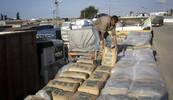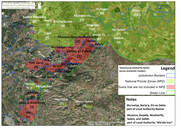11 aug 2020

The Palestinian border authorities in the Gaza Strip have said that the Israeli occupation authority (IOA) decided to ban entry of building materials into the coastal enclave as of Tuesday, August 11, and until further notice.
According to the goods coordination committee at the general department of borders and crossings in Gaza, private sector companies were informed of the Israeli decision to prevent shipments of building materials, such as cement, steel bars and aggregate, from entering Gaza.
The IOA claimed the measure was taken in response to the ongoing launch of balloons carrying incendiaries and explosives towards Israeli areas around Gaza.
However, local sources in Gaza described the flying of such balloons by angry youths as acts of protest against Israel’s failure to honor its pledges, under the last truce understandings, to ease the blockade on Gaza.
According to the goods coordination committee at the general department of borders and crossings in Gaza, private sector companies were informed of the Israeli decision to prevent shipments of building materials, such as cement, steel bars and aggregate, from entering Gaza.
The IOA claimed the measure was taken in response to the ongoing launch of balloons carrying incendiaries and explosives towards Israeli areas around Gaza.
However, local sources in Gaza described the flying of such balloons by angry youths as acts of protest against Israel’s failure to honor its pledges, under the last truce understandings, to ease the blockade on Gaza.
7 aug 2020

Israeli forces today ordered a halt on the construction of two inhabited houses in al-Maniya village, southeast of Bethlehem city, said a municipal source.
Head of al-Maniya Village Council Zeyad Kawazba told WAFA that Israeli forces stormed the village and delivered stop-construction military orders for two houses, each occupying an area of 150 meters squared.
The two houses belong to Assaf al-Froukh and his brother, Issa, and are inhabited by their families.
Located some nine kilometers to the southeast of Bethlehem, al-Maniya has a population of some 1,450 and occupies a total area of 8,908 dunams.
Under the Oslo Accords, an agreement made 25 years ago that was supposed to last just five years towards a self-governing country alongside Israel, the Palestinian Authority was given limited control over a tiny pocket of land occupying 906 dunams, accounting for 10.1 percent of the village’s total area.
Israel maintains control over 8,002, classified as Area C, accounting for 89.9 percent.
Israel demolishes Palestinian houses and structures almost on a daily basis as a means to achieve “demographic control” of the occupied territories.
Israel denies planning permits for Palestinians to build on their own land or to extend existing houses to accommodate natural growth, particularly in Jerusalem and Area C, which constitutes 60 percent of the occupied West Bank and falls under full Israeli military rule, forcing residents to build without obtaining rarely-granted permits to provide shelters for their families.
In contrast, Israel argues that building within existing colonial settlements is necessary to accommodate the “natural growth” of settlers.
Therefore, it much more easily gives the estimated 550,000 Jewish Israeli settlers there building permits and provides them with roads, electricity, water and sewage systems that remain inaccessible to many neighboring Palestinians.
The “Civil Administration” is the name Israel gives to the body administering its military occupation of the West Bank.
Soldiers in the oxymoronically named Civil Administration determine where Palestinians may live, where and when they may travel (including to other parts of the occupied territories like Gaza and East Jerusalem), whether they can build or expand homes on their own land, whether they own that land at all, whether an Israeli settler can takeover that land among others.
Head of al-Maniya Village Council Zeyad Kawazba told WAFA that Israeli forces stormed the village and delivered stop-construction military orders for two houses, each occupying an area of 150 meters squared.
The two houses belong to Assaf al-Froukh and his brother, Issa, and are inhabited by their families.
Located some nine kilometers to the southeast of Bethlehem, al-Maniya has a population of some 1,450 and occupies a total area of 8,908 dunams.
Under the Oslo Accords, an agreement made 25 years ago that was supposed to last just five years towards a self-governing country alongside Israel, the Palestinian Authority was given limited control over a tiny pocket of land occupying 906 dunams, accounting for 10.1 percent of the village’s total area.
Israel maintains control over 8,002, classified as Area C, accounting for 89.9 percent.
Israel demolishes Palestinian houses and structures almost on a daily basis as a means to achieve “demographic control” of the occupied territories.
Israel denies planning permits for Palestinians to build on their own land or to extend existing houses to accommodate natural growth, particularly in Jerusalem and Area C, which constitutes 60 percent of the occupied West Bank and falls under full Israeli military rule, forcing residents to build without obtaining rarely-granted permits to provide shelters for their families.
In contrast, Israel argues that building within existing colonial settlements is necessary to accommodate the “natural growth” of settlers.
Therefore, it much more easily gives the estimated 550,000 Jewish Israeli settlers there building permits and provides them with roads, electricity, water and sewage systems that remain inaccessible to many neighboring Palestinians.
The “Civil Administration” is the name Israel gives to the body administering its military occupation of the West Bank.
Soldiers in the oxymoronically named Civil Administration determine where Palestinians may live, where and when they may travel (including to other parts of the occupied territories like Gaza and East Jerusalem), whether they can build or expand homes on their own land, whether they own that land at all, whether an Israeli settler can takeover that land among others.
6 aug 2020

Map illustrating the towns in the petition
The Legal Center for Arab Minority Rights in Israel, in cooperation with The Arab Center for Alternative Planning filed a petition to the Israeli Supreme Court today against an Israeli government policy discriminating against Arab communities in the “northern triangle” region in the distribution of housing, construction, and land development benefits.
The petition, according to an Adalah press release, was filed on behalf of all Arab local authorities in Wadi Ara and 74 area residents, in cooperation with the Public Committee for the Defense of Land and Housing in Wadi Ara, the petitioners' own localities, the local councils of Umm al-Fahm, Baqa al-Gharbiya, the Ara-Ar’ara, Kfar Qara, Ma'ale ‘Iron, Basmah and Jatt, and the communities of Umm al-Qatif, Misar, and Al-‘Iryan which have not received “National Priority Area” (NPA) designation that would make them eligible for development and housing benefits and land discounts from the Israel Land Authority.
Adalah Attorney Suhad Bishara filed the petition with professional planning consultation from urban planner Enaya Banna from the Arab Center for Alternative Planning.
The NPA benefits provided to those localities included in the government’s current arrangement significantly reduce their housing and new construction costs.
These benefits include reduced land lease fees at a rate of up to 51 percent, as well as subsidies from Israel’s Construction and Housing Ministry for planning and development expenses related to new residential construction on state lands.
The petitioners argued that the government’s decisions on NPA eligibility do not comply with Israeli law regulating the classification of localities, said the press release.
This law was the result of a Supreme Court ruling in 2006 on a petition filed by Adalah on behalf of the High Follow-up Committee for Arab Citizens of Israel (HCJ 11163/03).
In that case, the court rejected the Israeli government’s arbitrary determination of criteria that had previously resulted in discrimination between Arab and Jewish localities on the basis of ethnicity or national belonging.
The law authorizing the Israeli government to determine national priority areas includes adherence to the principle of equality and the prohibition against discrimination, and also gives significant weight to the criterion of socio-economic ranking and the communities’ economic and social resilience.
The criteria are designed with the intention of reducing socio-economic disparities between communities, said Adalah.
Nevertheless, contrary to the clear language of the law, the Israeli government excluded Arab communities in the “northern triangle” area (Wadi Ara) from being classified as NPAs, despite their low socio-economic ranking.
Although these towns were classified as being in the "social periphery", they are not defined as NPAs because they fall within the boundaries of the Khadera sub-district which has a higher ranking.
As a result, other neighboring – significantly wealthier – localities are entitled to NPA benefits, while the poorer localities, which have filed the Supreme Court petition, are being denied these benefits.
For example, Arab communities situated in the Ma'ale ‘Iron Local Council (Musmus, Zalafa, Musheirifa, Salem, and Bayada) and the city of Umm al-Fahm – which all have low socio-economic rankings – do not enjoy the state benefits provided to the nearby wealthier Jewish localities of Givat Oz, Megiddo, Mizpe Ilan, Harish, Mevo Dotan, and Hermesh.
This state discrimination comes against the backdrop of housing shortages and dysfunctional development in the northern triangle’s Arab communities.
Along with the high population density, lack of urban planning, and shortage of available undeveloped lands, there also exists no development options that meet the needs of the population.
According to data in the petition, which was provided by The Arab Center for Alternative Planning, only 20 development tenders have been issued in the Wadi Ara area since 2010 – some 1,454 housing units – despite an estimated housing shortfall of 10,000 to 11,000.
In view of the Israeli government’s extreme violation of the law – and the concurrent violation of the principle of equality – the petitioners demanded that the Supreme Court cancel the relevant government decisions excluding the Arab communities or, alternatively, order the inclusion of Arab communities in the northern triangle amongst the list of localities designated as NPAs.
Adalah Attorney Suhad Bishara and Urban Planner Dr. Enaya Banna commented: “The Israeli government repeatedly creates mechanisms that systematically discriminate against Arab citizens.
Through manipulations of various parameters, it formulates a policy with an outcome that is clear: the weakest communities – those which should have been at the top of the government's priorities – are excluded.
It is also clear that the Israeli government has failed to abide by the Supreme Court's earlier ruling meant to put an end to this discriminatory practice.
Many additional actions must be taken to resolve the land and planning crisis in Arab communities and to promote proper development that can facilitate social and economic prosperity.”
The Legal Center for Arab Minority Rights in Israel, in cooperation with The Arab Center for Alternative Planning filed a petition to the Israeli Supreme Court today against an Israeli government policy discriminating against Arab communities in the “northern triangle” region in the distribution of housing, construction, and land development benefits.
The petition, according to an Adalah press release, was filed on behalf of all Arab local authorities in Wadi Ara and 74 area residents, in cooperation with the Public Committee for the Defense of Land and Housing in Wadi Ara, the petitioners' own localities, the local councils of Umm al-Fahm, Baqa al-Gharbiya, the Ara-Ar’ara, Kfar Qara, Ma'ale ‘Iron, Basmah and Jatt, and the communities of Umm al-Qatif, Misar, and Al-‘Iryan which have not received “National Priority Area” (NPA) designation that would make them eligible for development and housing benefits and land discounts from the Israel Land Authority.
Adalah Attorney Suhad Bishara filed the petition with professional planning consultation from urban planner Enaya Banna from the Arab Center for Alternative Planning.
The NPA benefits provided to those localities included in the government’s current arrangement significantly reduce their housing and new construction costs.
These benefits include reduced land lease fees at a rate of up to 51 percent, as well as subsidies from Israel’s Construction and Housing Ministry for planning and development expenses related to new residential construction on state lands.
The petitioners argued that the government’s decisions on NPA eligibility do not comply with Israeli law regulating the classification of localities, said the press release.
This law was the result of a Supreme Court ruling in 2006 on a petition filed by Adalah on behalf of the High Follow-up Committee for Arab Citizens of Israel (HCJ 11163/03).
In that case, the court rejected the Israeli government’s arbitrary determination of criteria that had previously resulted in discrimination between Arab and Jewish localities on the basis of ethnicity or national belonging.
The law authorizing the Israeli government to determine national priority areas includes adherence to the principle of equality and the prohibition against discrimination, and also gives significant weight to the criterion of socio-economic ranking and the communities’ economic and social resilience.
The criteria are designed with the intention of reducing socio-economic disparities between communities, said Adalah.
Nevertheless, contrary to the clear language of the law, the Israeli government excluded Arab communities in the “northern triangle” area (Wadi Ara) from being classified as NPAs, despite their low socio-economic ranking.
Although these towns were classified as being in the "social periphery", they are not defined as NPAs because they fall within the boundaries of the Khadera sub-district which has a higher ranking.
As a result, other neighboring – significantly wealthier – localities are entitled to NPA benefits, while the poorer localities, which have filed the Supreme Court petition, are being denied these benefits.
For example, Arab communities situated in the Ma'ale ‘Iron Local Council (Musmus, Zalafa, Musheirifa, Salem, and Bayada) and the city of Umm al-Fahm – which all have low socio-economic rankings – do not enjoy the state benefits provided to the nearby wealthier Jewish localities of Givat Oz, Megiddo, Mizpe Ilan, Harish, Mevo Dotan, and Hermesh.
This state discrimination comes against the backdrop of housing shortages and dysfunctional development in the northern triangle’s Arab communities.
Along with the high population density, lack of urban planning, and shortage of available undeveloped lands, there also exists no development options that meet the needs of the population.
According to data in the petition, which was provided by The Arab Center for Alternative Planning, only 20 development tenders have been issued in the Wadi Ara area since 2010 – some 1,454 housing units – despite an estimated housing shortfall of 10,000 to 11,000.
In view of the Israeli government’s extreme violation of the law – and the concurrent violation of the principle of equality – the petitioners demanded that the Supreme Court cancel the relevant government decisions excluding the Arab communities or, alternatively, order the inclusion of Arab communities in the northern triangle amongst the list of localities designated as NPAs.
Adalah Attorney Suhad Bishara and Urban Planner Dr. Enaya Banna commented: “The Israeli government repeatedly creates mechanisms that systematically discriminate against Arab citizens.
Through manipulations of various parameters, it formulates a policy with an outcome that is clear: the weakest communities – those which should have been at the top of the government's priorities – are excluded.
It is also clear that the Israeli government has failed to abide by the Supreme Court's earlier ruling meant to put an end to this discriminatory practice.
Many additional actions must be taken to resolve the land and planning crisis in Arab communities and to promote proper development that can facilitate social and economic prosperity.”

Israeli occupation forces seized today a concrete mixing pump in the town of Yatta, to the south of the occupied West Bank city of Hebron, local sources said.
Rateb al-Jabour, coordinator of the Wall and Settlements Resistance Committee, said staff of the so-called Israeli Civil Administration accompanied the Israeli occupation forces seized the pump while it was working in the building of a house for the benefit of a local Palestinian resident.
The site of the construction is located in an area classified as Area C, under full Israeli military and civil control, where Israeli occupation authorities ban almost all kinds of urban development to the Palestinian population.
Rateb al-Jabour, coordinator of the Wall and Settlements Resistance Committee, said staff of the so-called Israeli Civil Administration accompanied the Israeli occupation forces seized the pump while it was working in the building of a house for the benefit of a local Palestinian resident.
The site of the construction is located in an area classified as Area C, under full Israeli military and civil control, where Israeli occupation authorities ban almost all kinds of urban development to the Palestinian population.
